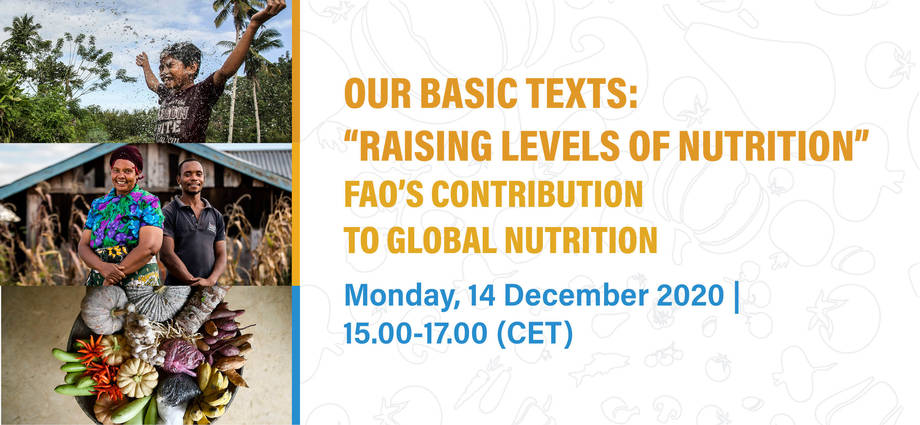WEBINAR

The event will be convened by FAO’s Economic and Social Development stream, under the auspices of the Chief Economist.
Interpretation will be provided in English, French and Spanish.
FAO was established 75 years ago as the first specialized agency of the United Nations. At the time, hunger was rife and with the imminent potential of a rising world population the question was - can the world produce enough food to feed its population? Thus, for the then newly created agency, the priority was to ensure that there was sufficient food to feed the world. Despite the prevailing hunger situation, FAO was given a clear mandate on “raising levels of nutrition”. To buttress this, Sir Boyd-Orr, a renowned British nutritionist was nominated as its first Director-General. His ground-breaking nutrition research highlighted the importance of micronutrient, and not just calories, in ensuring adequate diets.
Since then the global nutrition situation has evolved. Although chronic hunger is still affecting 690 million people globally, the face of malnutrition has changed significantly. We have micronutrient deficiencies affecting about two billion people and overweight and obesity are rising rapidly, currently affecting over two billion persons globally. Many countries are facing multiple burdens of malnutrition. Underlying the current global nutrition situation are poor diets which are now the leading cause of disease (especially non-communicable diseases such as diabetes, heart diseases and some cancers) and death.
The spotlight has now shifted to food systems and their failings in providing healthy diets. The 2020 State of Food Security and Nutrition in the World Report (SOFI 2020) presented concerning statistics highlighting that globally three billion people cannot afford a healthy diet.
Today the question to ask is: can the world produce enough nutritious food to nourish its fast-growing population? Working towards the objectives of the 2030 Agenda for Sustainable Development, FAO’s mandate in raising levels of nutrition should focus on ensuring healthy diets within a transformed food system.
FAO is currently updating the Vision and Strategy for FAO’s Work in Nutrition and appropriately is setting for itself the vision of “a world where all people are eating healthy diets from sustainable food systems”.
Dr QU Dongyu, Director-General of FAO, is leading the Organization to chart a new “path to a better tomorrow, through better production, better nutrition, a better environment and a better life”.
AGENDA
15:00 – 15:10 | OPENING REMARKS: Dr QU Dongyu, Director-General, FAO |
15:10 – 15:25 | Keynote Speaker: Prof. Jessica Fanzo, Bloomberg Distinguished Professor of Food Policy and Ethics, Johns Hopkins University |
15:25 – 15:30 | Commentary: Dr Lawrence Haddad, Executive Director, Global Alliance for Improved Nutrition (GAIN) |
15:30 – 15:45 | Keynote Speaker: Prof. William A. Masters, Friedman School of Nutrition Science and Policy and Department of Economics, Tufts University |
15:45 – 16:05 | Keynote Speaker: Dr Anna Lartey, Director, Food and Nutrition Division, FAO |
16:10 – 16:30 | PANEL DISCUSSION |
Dr Rob Knight, Professor of Pediatrics, Bioengineering, and Computer Science & Engineering, University of California, San Diego | |
Dr Francesco Branca, Director, Nutrition and Food Safety Department, World Health Organization (WHO) | |
Prof. Sandy Thomas, Director, Global Panel on Agriculture and Food Systems for Nutrition | |
16:30 – 16:55 | Q&A SESSION |
16:55 – 17:00 | Closing Remarks: Dr Maria Helena Semedo, Deputy-Director General, FAO |
